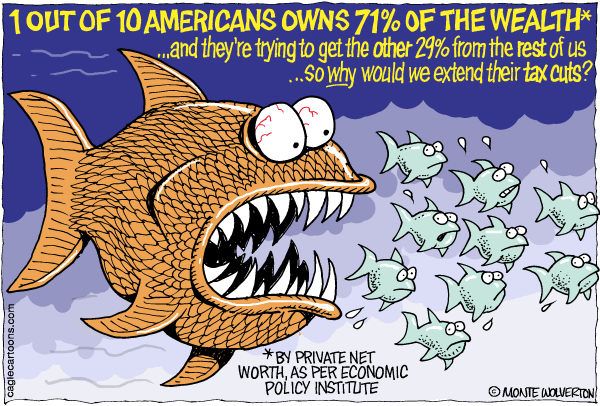
The Top 5%. It's not about income. "It's Net Worth, Stupid!"
***
Why the FT is wrong and Piketty is right. "This doesn't seem to be a Reinhart and Rogoff situation. Their Excel errors really did change their conclusions. Piketty's don't. Unless, like Giles, you average inequality by population instead of by country -- which is debatable, at best, since Piketty is only concerned about inequality within countries. Still, it's another reminder that economics is the least exact science. That's why it's critical for researchers to make their data public, so everyone else can double and triple check it. To his credit, Piketty has done just that. Now he should tell us a little more about his methods." Matt O'Brien in The Washington Post.
U.S. wealth inequality is rising, and other things the FT analysis gets wrong. "Giles states that 'it is not possible to say anything much about the top 10 per cent share between 1870 and 1960, as the data for the US simply does not exist.' However, as Matt Bruenig points out, since Piketty's book came out there's been significant new work by Emmanuel Saez and Gabriel Zucman telling us exactly that. Check out the slides, they are awesome. Well respected work that fills in the makeshift gaps Piketty had to use to make the wealth inequality data for the United States in this period. This is a sign of a good work -- subsequent work is bearing out its results." Mike Konczal in the Roosevelt Institute.
Piketty used faulty data in inequality book, Financial Times alleges. "Thomas Piketty, author of a best-selling book on the widening gap between rich and poor, relied on faulty data that skewed his conclusions, the Financial Times reported on its web site. The mistakes undercut Piketty's argument that wealth inequalities are heading back up to levels last seen before World War I, wrote Chris Giles, the FT's economics editor....After correcting for these apparent errors, two of the book's 'central findings -- that wealth inequality has begun to rise over the past 30 years and that the U.S. obviously has a more unequal distribution of wealth than Europe -- no longer seem to hold,' according to Giles." Rich Miller in Bloomberg.
Primary sources:
The full Financial Times investigation. Chris Giles in The Financial Times (paywalled).
The full text of Piketty's response. The Financial Times (paywalled).
Explainer: The types of alleged errors, and what they mean. Neil Irwin in The New York Times.
Maybe not. The FT's analysis doesn't debunk Piketty's claims, economists say. "Scott Winship, a fellow at the New York-based Manhattan Institute for Policy Research, said the newspaper's allegations aren't 'significant for the fundamental question of whether Piketty's thesis is right or not.' James Hamilton, an economics professor at the University of California, San Diego, said there's 'abundant evidence' of widening inequality 'from a good many sources besides Piketty.'"Matthew Boesler and Aki Ito in Bloomberg.
@swinshi: I've spent time with Piketty U.S. wealth ineq spreadsheet and LOTS of time with his income data. He's not up to funny business.
This kerfuffle also says nothing about income inequality. "Mr. Piketty is famous for having produced estimates of not just the share of wealth held by the top 1 percent (or top 10 percent), but also for his estimates showing a greater concentration of income among high earners. The F.T. re-analysis is entirely about wealth inequality, and no serious questions have been raised about the veracity of the data on the rising income shares of the top 1 percent." Justin Wolfers in The New York Times.
More charts on the U.S. wealth inequality trend: Atif Mian and Amir Sufi in House of Debt.
One way the kerfuffle does echo Reinhart-Rogoff: The partisan bomb-throwing. "There was an outbreak of gloating across the wires the moment the Financial Times story went live. The book has plenty of critics...and many of which reached gleefully for word that Mr Piketty's work might not be perfect. One suspects that in a public back-and-forth that has often failed to hew particularly closely to the substance of the book, this will become an excuse for many to write the book off, and for others a piece of ammo to fire at ideological opponents. In that way, and in many others, this does look quite a lot like the Reinhart-Rogoff contretemps, to which Mr Giles draws a parallel." The Economist.
Why was Piketty using spreadsheets, anyway? "Mr. Piketty's work is not complex and multivariate. It's fairly simple. And for that, a spreadsheet is a reasonable choice. Moreover, because advanced training is not required to examine a spreadsheet, by working in one, and sharing it, Mr. Piketty made it possible for more people to check his work. That's praiseworthy. If the allegations hold up, Mr. Piketty may have made some errors in his spreadsheet. But the choice of that tool is not to blame for them. Were his work more complex, he'd likely have been better off using a statistical programming language. But it isn't, and a spreadsheet is just fine." Austin Frakt in The New York Times.
KRUGMAN: Is Piketty all wrong? "The notion of stable wealth concentration in the United States is at odds with many sources of evidence....It's just not plausible that this increase in the concentration of income from capital doesn't reflect a more or less comparable increase in the concentration of capital itself....If his attempted reworking of Piketty leads to the conclusion that nothing has happened to wealth inequality, what that really shows is that he's doing something wrong. None of this absolves Piketty from the need to respond to each of the individual questions. But anyone imagining that the whole notion of rising wealth inequality has been refuted is almost surely going to be disappointed." Paul Krugman in The New York Times.
No comments:
Post a Comment